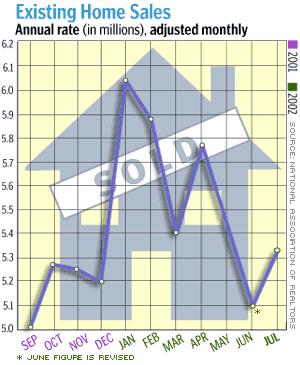NEW YORK (CNN/Money) -
The potential dark side of a red-hot U.S. housing market showed its face in the second quarter, as Americans defaulted on their mortgage loans at a record pace.
The Mortgage Bankers Association (MBA) said Monday that 1.23 percent of all U.S. mortgages were in the process of foreclosure at the end of the second quarter, the highest rate on record, compared with 1.10 percent in the first quarter and the previous record of 1.14 percent, set in the first quarter of 1999.

The MBA also said that 4.77 percent of homeowners were delinquent -- behind a month or more on their mortgage payments -- compared with 4.65 percent in the first quarter.
Most economists, however, downplayed the significance of this data, saying that an influx of new homeowners, attracted by historically low mortgage rates, naturally raised the number of people who would also struggle to make payments.
"The historical low delinquency rate was 3.9 percent in the late 1970s, while the historical high for delinquencies was 6.07 percent [in 1985]," said MBA chief economist Doug Duncan. "Right now it's right in the middle between the all-time low and the all-time high, and we're just coming out of a recession."
An increase in unemployment and a slowdown in wage growth after a recession that began in March 2001 has also hindered borrowers' ability to make payments, Duncan and other economists agreed.
All in all, most economists doubted the data implied significant potential weakness in the housing market, which has been outrageously strong despite the recession.
| |
 Related stories
Related stories
| |
| | |
| | |
|
"Mortgage rates are very low; usually when they're high is when the economy begins to deteriorate, and that leads to tighter lending," said David Lereah, chief economist at the National Association of Realtors (NAR). "But mortgage rates are low and the debt service is low, so the burden's not that high right now -- there won't be as much tightening as under other scenarios."
Demand for houses will drive sales of new and existing homes to a record pace in 2002, according to the NAR. Home prices have risen a whopping 31 percent in the past five years, including 7.4 percent in the past year alone -- much higher than normal increases.
These higher prices have made homeowners wealthier, helping them weather a prolonged bear market for U.S. stocks. And a surge of mortgage refinancing has lowered monthly payments, while people have been able to borrow on their increased home equity.
These factors have helped support consumer spending, which drives about two-thirds of the total U.S. economy.
Some observers have worried that prices are just too high, that there's a "bubble" in the housing market that will pop, soaking homeowners and sinking the economy.
But most economists say that the current housing market does not look like a bubble because there's very little excess housing supply on the market, meaning prices aren't artificially inflated.
"I don't think home values will crash -- they will rust, not bust," said Richard Berner, chief U.S. economist at Morgan Stanley. "Demographics have underpinned demand, courtesy of a wave of immigration in the past 16 years that reduced supply, and you don't see the speculative overhang that could contribute to a bust in home values."
The MBA report came on the same day as a Federal Reserve report that growth in consumer credit surged to a 7.6 percent annual rate in July, including a 10.8 percent jump in credit card debt, home equity loans and other revolving credit.
| |
 Calculators: Your Home
Calculators: Your Home
| |
| | |
| | |
|
The housing market could also be slowed down a bit as mortgage lenders, seeing the gains in delinquencies and defaults, tighten their standards for issuing loans. Most observers doubt such a tightening will be enough to make much of a dent in the housing market.
"I don't think we'll see credit standards get too tight," said Greg McBride, a financial analyst with Bankrate.com. "To get the very best rate, borrowers are having to be more pristine in terms of their credit history and personal balance sheet. That makes [borrowing] more difficult, but it doesn't shut people out."
And while a Wall Street Journal report on rising mortgage defaults partially blamed aggressive lenders for luring people with less-than-stellar credit into a financial situation they couldn't afford, McBride pointed out that the buck stops, finally, with the buyer.
"The borrower is the one that has to make the monthly payments, not the loan officer," he said. "In the event that a borrower is pushed into a loan they may not be able to afford, that's a decision they have to make -- and they're in the best position to make that decision."

|

